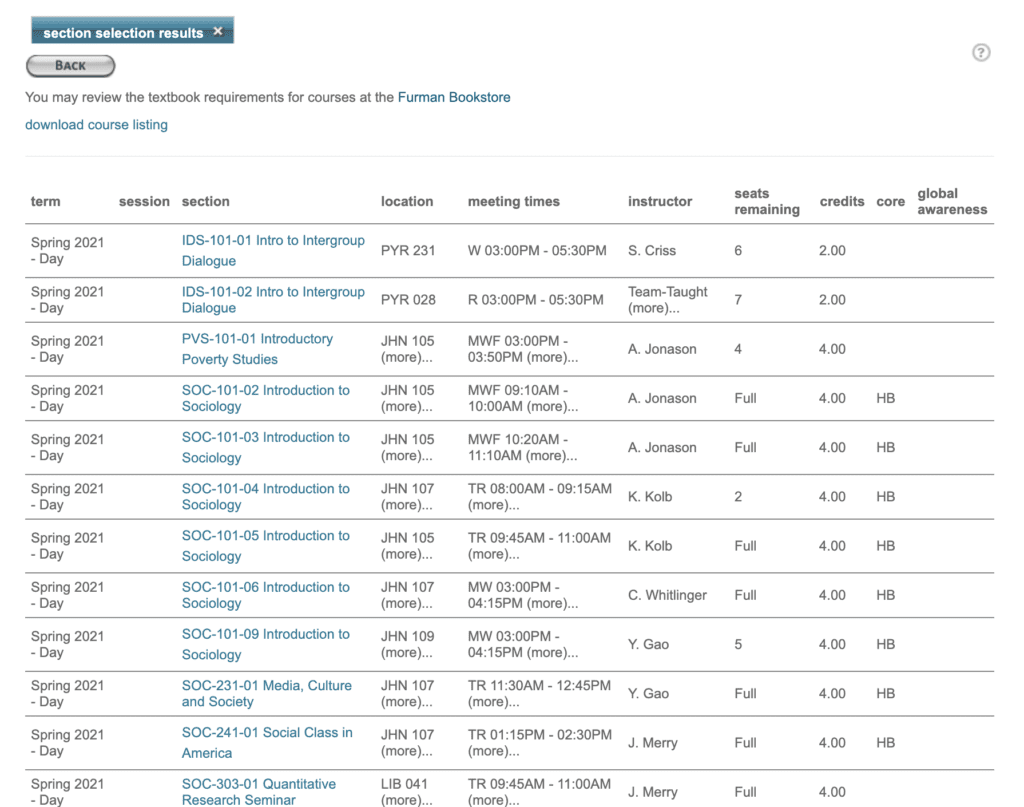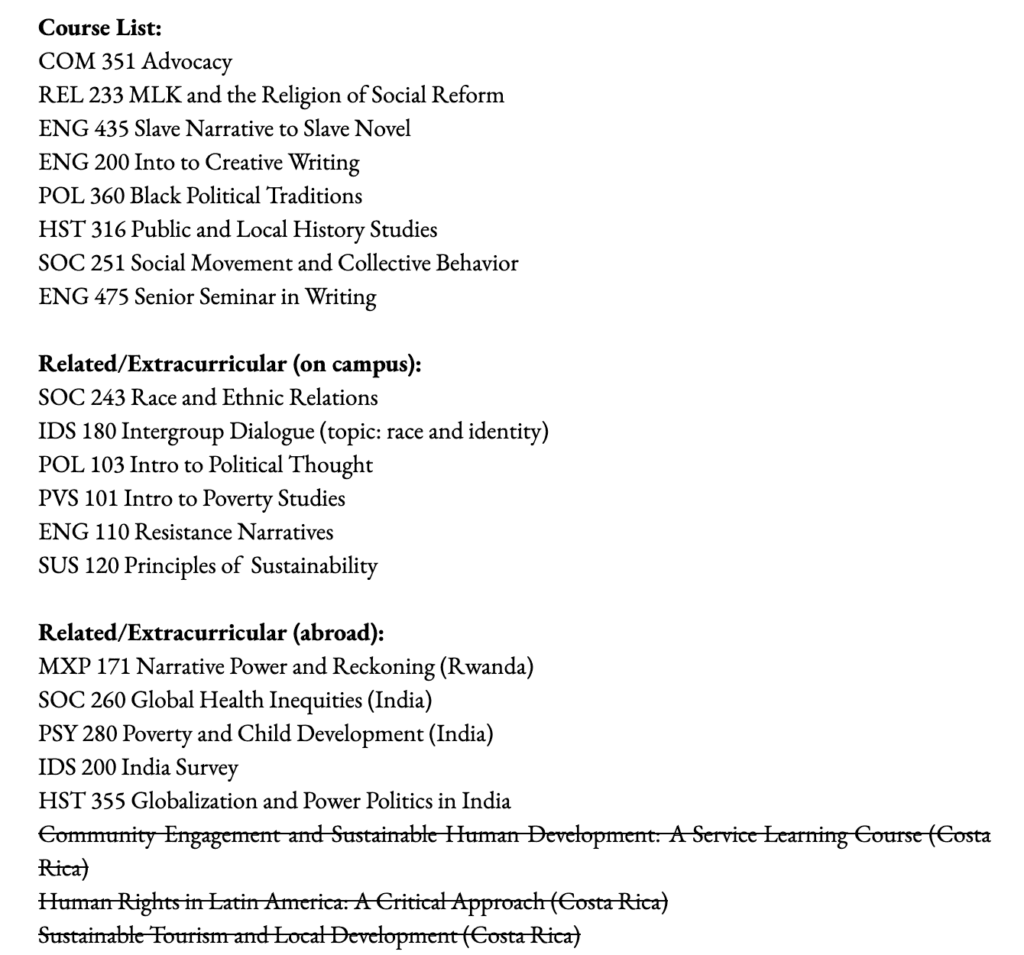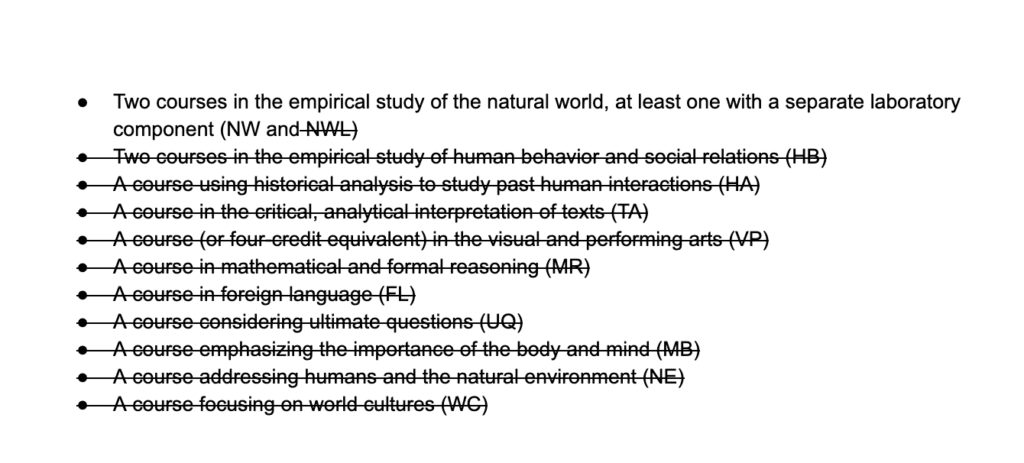Admissions Blog Posts
Planning for Your Major
I will admit… I’m a bit of a planner.
And when I say I’m a planner, I mean that before I even stepped foot on campus for my Freshman year, I had mapped out a potential four year plan. (If you’re familiar with CliftonStrengths, then it’ll make sense that one of my top five strengths is futuristic.) I find it really fun to imagine all the possibilities of the future, but planning has also helped me be strategic about how I plan to reach my goals and get the most out of my education.
Luckily, if planning is not your jam, you don’t have to choose a major until the end of your sophomore year. Furman actually encourages not having a specific plan so you can explore your interests and find the right fit for you.
I say, it’s a balancing act.
When I got to Furman, I wasn’t sure what my major was going to be. I had an idea of things I was interested in, but just wasn’t sure where would be the best place for me. In the summer when I met with my temporary advisor to make my first semester schedule, I decided to go half-in-half on trying classes I had never considered taking (like Religion and German) and classes I knew I’d be interested in (my first year writing seminar in political thought and Sociology).
As I got deeper into the semester, I began to have a clearer picture about what I might want in a major. I decided that I wanted to create my own major (which is a whole other long process… you can read about it here.) through the Individual Curriculum Program.
I spent the rest of my first semester, all of my second semester, summer break, first semester of my sophomore year, and even the beginning of my second semester sophomore year building a major that was perfect for me. I ended up calling it Advocacy and Justice and it has been completely approved!
This is kind of a rare experience for Furman students to build their own major, and it takes a lot of organization, commitment, and patience to do it, but it works similarly to planning for a normal major. Here are some tips when planning your major:
In planning your major schedule, you want to know what courses you’re required to take. Many majors require that you take about 9-11 courses. Of those courses are ones that are required of everyone (these are usually your intro classes and your methods classes) and courses that you get to choose (these are usually your electives and you get to choose what you’re most interested in).
It’s important to plan what classes you’re going to take ahead of time, as best as you can, because all Furman students are required to also complete a number of GERs (general education requirements) in addition to your major courses. It’s also important to remember that courses are offered at different times of the year and some are only offered once a year or every two years. You don’t need to know what classes you will take two or three years ahead of time, but it’s good to have an idea about what classes you might take for the semester or two ahead of where you are right now.
Towards the middle of every semester, courses for the next semester are posted on My.Furman (our student portal) and you are able to see what classes will be taught, by who, and when.

When creating my major, I had to make sure that I would be able to finish taking all of my classes before I graduated. I sat down with department chairs and asked when they expected to offer courses I was interested in including in my major. They were able to tell me which classes they expected to offer for my junior and senior years so I could plan ahead.

Once I knew when my major classes were going to be offered, I could think about when I wanted to take my GERs and if I wanted to complete any minors. Minors can be a really fun way to take classes that you’re interested in, but are not majoring in. They’re even a good opportunity to dive into a subject that is not really related to your major at all. All minors at Furman are interdisciplinary so you take courses from all different departments and a lot of times you can find courses that complete your GERs too!

Luckily for me, many of my major classes overlapped with my minor classes, so I am able to complete two minors in Poverty Studies and African American & Diaspora Cultures while only taking a couple extra courses.
I also found ways to take GERs that fit my educational interests. I took an English class about resistance narratives for my TA credit, a sustainability course for my NE + NWL credits, and a digital storytelling course for my VP credit. All of these classes are different from my major classes, but have helped me think more deeply about topics related to my major and learn skills that are helpful for advocacy.

Finally, I’d say in planning for your major, know that things change often and even if you plan your entire Furman career starting with day one, things are not always going to go to plan and you’re going to have to re-think and re-arrange your plan often. But that’s okay! and that’s honestly part of the fun. Sometimes not getting into a class you wanted leads you to taking a class you never expected to love so much or a class that totally changes what you want to do in life.
It’s that balancing act I was talking about earlier– it’s good to be prepared and have a good idea about your plans, but don’t let that stop you from exploring, trying new things, and being surprised along the way!
-Asha